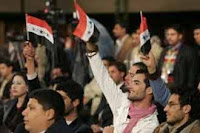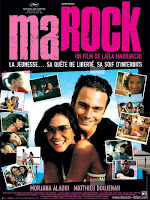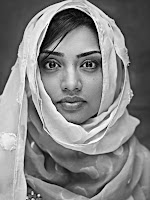 "French short film 'La Danse, l'art de la rencontre' (Dance and the Art of Encounters) won first prize at the four-day Baghdad international film festival which ended on Saturday. Domenica Hervieu's documentary, a poetic exploration of the world of dance, was followed by 'Abu Ghraib and Kilo 160', a documentary by Iraqi director M. Nafs, the president of the jury Akil Mahdi announced. The film by Nafs tells the tragic story of Iraq's 14-member taekwondo team who were kidnapped and slaughtered in the western Anbar province in 2006 as they returned from a competition in Jordan. The bodies of 13 of the team were found earlier this year
"French short film 'La Danse, l'art de la rencontre' (Dance and the Art of Encounters) won first prize at the four-day Baghdad international film festival which ended on Saturday. Domenica Hervieu's documentary, a poetic exploration of the world of dance, was followed by 'Abu Ghraib and Kilo 160', a documentary by Iraqi director M. Nafs, the president of the jury Akil Mahdi announced. The film by Nafs tells the tragic story of Iraq's 14-member taekwondo team who were kidnapped and slaughtered in the western Anbar province in 2006 as they returned from a competition in Jordan. The bodies of 13 of the team were found earlier this year"In third place was 'Palm Whisper' by Egyptian director Shireen Shaith. Nafs was the only winner present at the awards ceremony, which was held under tight security. The festival, held at Baghdad's Palestine Hotel, screened 63 films from around the world. [...]
"The Iraqi film industry dates back to the 1940s and was at its most popular in the 1970s and 1980s, when going to the cinema became a weekly family outing.However the 1991 Gulf war and the economic sanctions that followed saw cinemas go into decline. The turmoil that followed the 2003 invasion saw many cinemas burned down."
Source: AFP, December 29, 2007
 "Some of the most interesting features at the 2007 Dubai International Film Festival were noncompetition films. Among them were two movies, 'Heya Fawda' ('Chaos') and 'Whatever Lola Wants,' that are striking for their similarities and contrasts. The differences between the two films are obvious, not least the filmmakers themselves. With an output of over 40 films, 81-year-old Youssef Chahine, co-director of "Chaos," is an icon in his native Egypt and lauded worldwide.
"Some of the most interesting features at the 2007 Dubai International Film Festival were noncompetition films. Among them were two movies, 'Heya Fawda' ('Chaos') and 'Whatever Lola Wants,' that are striking for their similarities and contrasts. The differences between the two films are obvious, not least the filmmakers themselves. With an output of over 40 films, 81-year-old Youssef Chahine, co-director of "Chaos," is an icon in his native Egypt and lauded worldwide.

 Beur Blanc Rouge
Beur Blanc Rouge






 "[...] The Marrakesh International Film Festival, which opened with an opulent ceremony at the Palais des Congres Friday night, comes too late in the year to host an onslaught of world premieres. It is too young - and geographically too far removed from the power centers that fuel the global movie business - to be a major player like Cannes.
"[...] The Marrakesh International Film Festival, which opened with an opulent ceremony at the Palais des Congres Friday night, comes too late in the year to host an onslaught of world premieres. It is too young - and geographically too far removed from the power centers that fuel the global movie business - to be a major player like Cannes.
 See the following movie on Terrorism in Algeria:
See the following movie on Terrorism in Algeria:



 EGYPTIAN FILM
EGYPTIAN FILM
 "The firing of three veiled presenters from Moroccan radio station Casa FM has highlighted the issue of an implicit ban being slapped on veiled women working in different media outlets in the Arab country.
"The firing of three veiled presenters from Moroccan radio station Casa FM has highlighted the issue of an implicit ban being slapped on veiled women working in different media outlets in the Arab country.